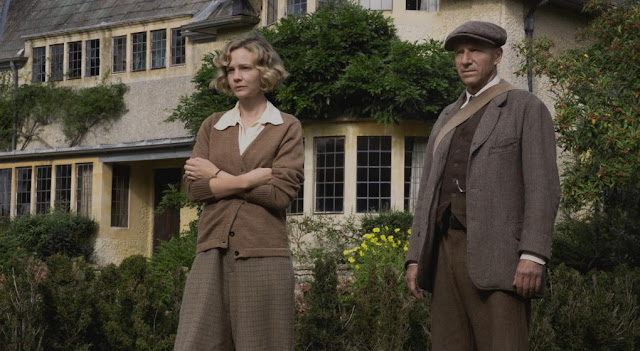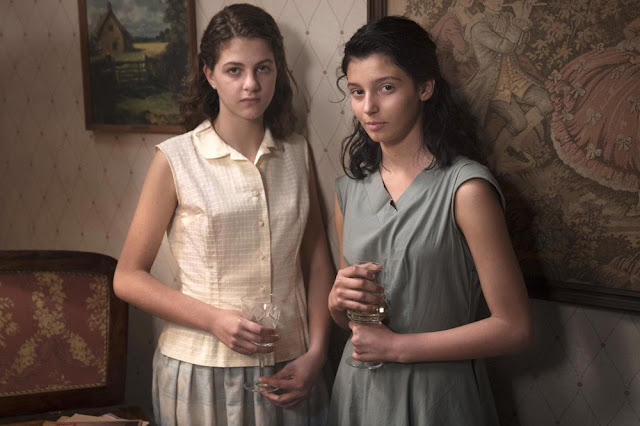La excavación / The Dig
(Español / English)
Corre 1939 y Edith Pretty (Carey Mulligan), contrata a un
excavador, Basil Brown (Ralph Fiennes) para que comience a excavar (valga la
redundancia) unos túmulos que se hallan en la propiedad de la primera, en la presunción
de que esconden un gran tesoro arqueológico.
La película de Simon Stone, basada en una novela que
ficcionaliza un suceso real, pretende abordar una importante (y necesaria) serie
de tópicos alrededor del descubrimiento que se produce: la propiedad del patrimonio
arqueológico, los peligros de la actividad en sí, la finitud y fragilidad
humanas frente a la eternidad de la Historia y los objetos, la paternidad del
crédito y la gloria por los descubrimientos, la diferencia de clases, el
conocimiento histórico en sí, la memoria y la ominosa amenaza de un guerra en
ciernes.
Un interesante conjunto de aspectos que no cristalizan en una síntesis
y una expresión dramática contundentes. El descafeinado film de Stone remeda de
algún modo el qualité british de Ivory, pero no parangona su misterio. Tampoco
estamos ante Downton Abbey y muchos menos The Crown. Sus personajes a los 10
minutos ya están definidos. Por otro lado, la épica de la búsqueda y el descubrimiento,
esencial en una historia de este tipo, no entusiasma. Cuando algunos personajes
y situaciones se quedan sin gas, el director apunta el foco sobre otros y hasta
modifica la estructura narrativa para recuperar el interés del espectador, con
resultados parciales. Acaso sea que la melancolía de Mrs. Pretty y Mr. Brown definan
el clima de la película, pero esto repercute en sus resultados.
Desde ya que la fotografía es bella, la música omnipresente
e invasiva y las actuaciones muy buenas, en particular las de los infalibles
Fiennes y Mulligan a quienes se suma Lily James, a cargo de la joven arqueóloga
Peggy Preston, acaso el personaje más interesante y que aporta oxígeno a una historia
que será protegida y defendida por el hoy omnipotente escudo del “basada en hechos
reales” y el inextinguible cholulismo que sigue generando la nobleza inglesa.
It is 1939 and Edith Pretty (Carey Mulligan) hires an
excavator, Basil Brown (Ralph Fiennes) to begin excavating (forgive the
redundancy) some burial mounds found on the property of the former, on the
presumption that they hide a great archaeological treasure.
Simon Stone's film, based on a novel that fictionalizes a
real event, aims to address an important (and necessary) series of topics
around the discovery that occurs: ownership of the archaeological heritage, the
dangers of the activity itself, finitude and human fragility in the face of the
eternity of History and objects, the paternity of credit and glory for
discoveries, class difference, historical knowledge itself, memory and the
ominous threat of a war in the making.
An interesting and set of aspects that do not provide a
conclusive synthesis and dramatic expression. Stone's decaffeinated film
somehow mimics Ivory's British quality, but doesn't match his mystery. We are
not facing Downton Abbey and much less The Crown. His characters at 10 minutes
are already defined. On the other hand, the epic of search and discovery,
essential in a story of this kind, is not exciting. When some characters and
situations run out of gas, the director focuses the focus on others and even
modifies the narrative structure to regain the viewer's interest, with partial
results. Perhaps the melancholy of Mrs. Pretty and Mr. Brown defines the
climate of the film, but this affects its results.
Since the photography is beautiful, the music is omnipresent and invasive and the performances are very good, in particular those of the infallible Fiennes and Mulligan who are joined by Lily James, in charge of the young archaeologist Peggy Preston, perhaps the most interesting and that brings oxygen to a history that will be protected and defended by the now omnipotent shield of the “based on real events” and the inextinguishable cholulism that the English nobility continues to generate





Comentarios
Publicar un comentario
Mensajes sujetos a moderación